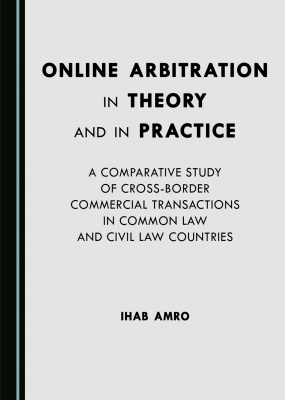Review: Online Arbitration in Theory and in Practice: A Comparative Study in Common Law and Civil Law Countries by Ihab Amro

The book Online Arbitration in Theory and in Practice: A Comparative Study in Common Law and Civil Law Countries1 written by Ihab Amro is a comprehensive review of the electronic contracts and online arbitration in common law and civil law countries. It is a hardcover published by Cambridge Scholars Publishing 2018 and is one the few books dedicated exclusively to online arbitration.
The Online Arbitration in Theory and in Practice provides an in-depth analysis of how international arbitration institutions deal with online filing of cases, online notifications, and online hearings. I was pleased to find out that the book mentions that the Arbitration Association (Russia, Moscow) created an online arbitration system to facilitate the resolution of commercial disputes arising out of contractual and non-contractual transactions through the means of technology. In 2015, the Arbitration Association adopted a special set of online arbitrations rules (“The Arbitration Association Online Rules”).
The Arbitration Association Online Rules mainly deal with the Arbitration Association online system, online arbitration participant(s), time periods, place of arbitration proceedings, language of arbitration proceedings, appointment of an arbitrator, challenge of an arbitrator, replacement of an arbitrator, initiation of arbitration proceedings, including statement of claim, commencement of online arbitration, and statement of defence. Apart from that, the Rules deal with the applicable rules of law, evidence, failure to produce documents and non-appearance of party, the possibility for conducting the proceedings, either with or without hearings, amicable settlement agreements, making of an online arbitral award, including time periods, interpretation and modification of an online arbitral award.
In the first chapter of the book “Cross-border electronic commerce transactions in theory and practice” the author concludes that in the last three decades e-commerce has become a leading avenue for global trade and has surpassed traditional off-line commerce. E-commerce includes all forms of commercial transactions executed by electronic means. In the book the author compares how electronic commercial contracts are different from the traditional commercial contracts: Mr. Amro provides a detailed explanation of B2B and B2C contracts and puts a clear border line between e-commerce and other types of commerce. A distinguishing feature of the book is the analysis of the legal problems of e-commerce, in particular, jurisdictional issues, validity of electronic contracts and intricacies related to the choice of the applicable law. The author not only raises questions, but proposes possible solutions to some of the key problems associates with the international e-commerce.
The second chapter of the book “Legal Framework Regulating Cross-Border Electronic Commerce and its Impact on Electronic Contracting” is dedicated to regulatory regimes of cross-border electronic commerce and their impact on e-contracts. Mr Amro analyses a number of key legal documents, such as the UNCITRAL Model Law on Electronic Commerce of 1996, the UNCITRAL Model Law on Electronic Signatures of 2001, the UN Convention on Contracts for the International Sale of Goods of 1980, the UNIDROIT Principles on International Commercial Contracts of 2010, and the OECD Guidelines for the Consumer Protection in the Context of Electronic Commerce Transactions of 1999 and other.
In the third chapter “The Use of online arbitration in the resolution of international commercial disputes” the author considers online arbitration as a special kind of arbitration which is suitable for settlement of cross-border commercial disputes. The author delimits online arbitration agreements and traditional arbitration agreements. Most importantly, Mr Amro considers such questions as formation and validity of online arbitration agreements, place of online arbitration and nationality of arbitral awards, peculiarities of online arbitral process, applicability of due process in online arbitration and rendering of online arbitral awards. These issues are somewhat new to the international arbitration community and therefore the conclusions of the author are novel and deserve attention.
In the fourth chapter “Enforcement of cross-border online arbitral awards and online arbitration agreements in national courts” Mr. Amro outlines the mechanisms for the enforcement of online arbitral awards and arbitration agreements under the New York Convention on the Recognition and Enforcement of Foreign Arbitral Awards (1958). The author explains in detail the obstacles which the awards issued in online arbitration may face in the national jurisdictions. In particular, the writing form requirements, absence of a physical place of arbitration, the issues of due process, notifications, formality of documents issues and the setting aside of online arbitral awards problems.
In the fifth chapter the author explains the relationship between online arbitration and consumer disputes. The author concludes that online arbitration may not be a suitable option for the resolution of consumers’ disputes.
Finally, the author addresses an issue of application of the Rome I Regulation to B2C e-commerce contracts and to e-arbitration.
This book is a valuable contribution to the contemporary discussion on the efficiency and future of commercial arbitration and a great addition to a bookshelf of any modern arbitration practitioner.
Roman Zykov
Secretary General
Arbitration Association
1 Ihab Amro, Online Arbitration in Theory and in Practice: A Comparative Study in Common Law and Civil Law Countries. Cambridge Scholars Publishing; 1 edition. 285 pages. ISBN-10: 1527515915

Roman Zykov
Arbitration Association
Moscow